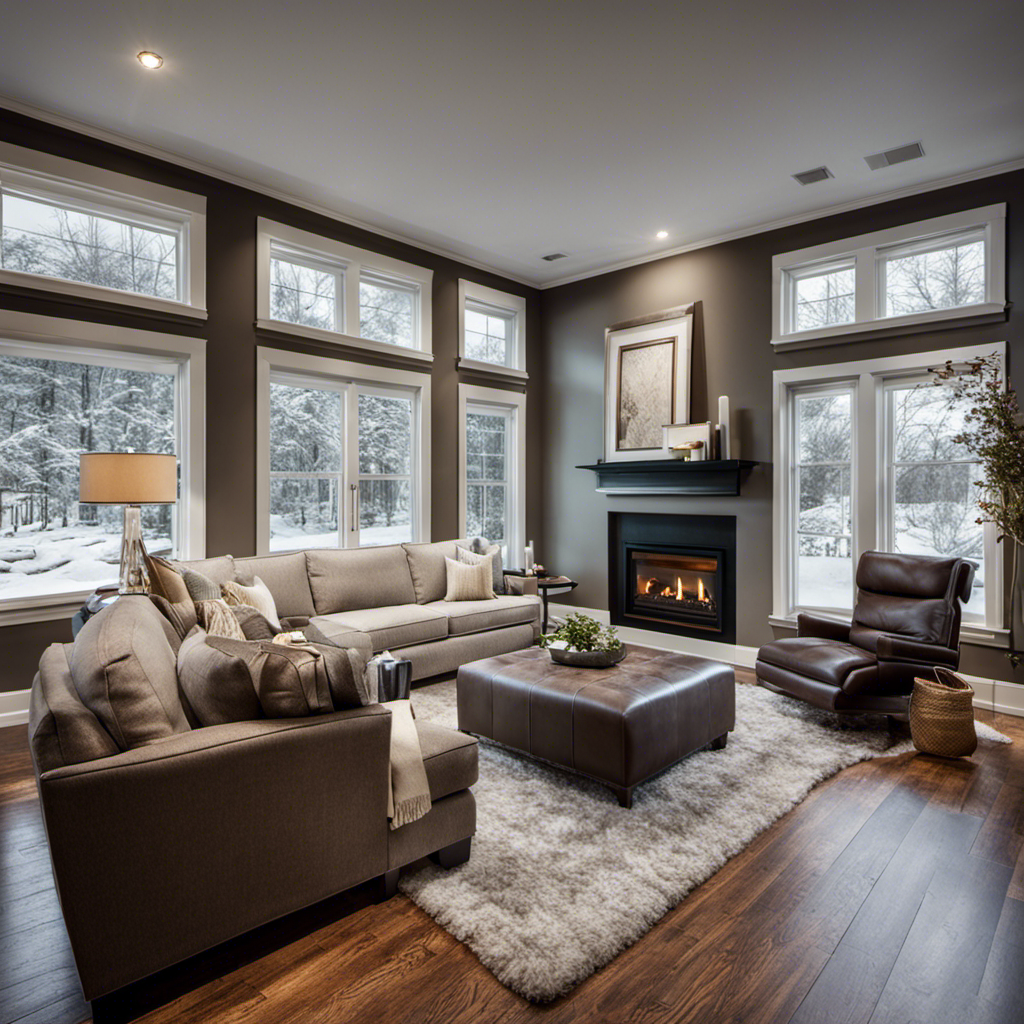As the winter season approaches, it is crucial to ensure that your home’s HVAC system is prepared to withstand the cold temperatures and keep you and your family comfortable.
This article provides expert guidance on how to effectively winterize your HVAC system, from inspecting and cleaning it to sealing air leaks and insulating your home.
By following these steps, you can optimize the performance of your HVAC system and enhance energy efficiency, ultimately serving your family’s needs during the winter months.
Key Takeaways
- Winterizing your HVAC system is important to prevent potential issues during colder months and ensure efficient and effective operation.
- Inspecting and cleaning your HVAC system, including checking and replacing air filters, cleaning outdoor units and condenser coils, and inspecting ductwork, is crucial for maintaining airflow, efficiency, and indoor air quality.
- Sealing air leaks and insulating your home, such as weatherproofing windows, adding attic insulation, and sealing gaps or cracks, improves energy efficiency and minimizes heat transfer.
- Regularly checking and replacing filters, maintaining thermostat settings, and using programmable thermostats optimize performance, save energy, and maintain air quality.
Understanding the Importance of Winterizing Your HVAC System
When it comes to ensuring optimal performance and longevity of your HVAC system during the winter months, understanding the importance of winterizing is crucial.
Preparing for HVAC maintenance by winterizing your system can provide numerous benefits. By taking the time to winterize your HVAC system, you can prevent potential issues that may arise during the colder months.
Winterizing involves cleaning and inspecting the system, changing filters, and sealing any air leaks. This not only helps to improve indoor air quality but also ensures that your system operates efficiently and effectively.
Additionally, winterizing your HVAC system can help to lower energy costs by reducing the workload on the system and preventing unnecessary wear and tear.
Inspecting and Cleaning Your HVAC System
To ensure optimal performance and efficiency, it is essential to thoroughly inspect and clean your HVAC system before the winter season. Regular HVAC maintenance is crucial for extending the lifespan of your system and preventing unexpected breakdowns.
Start by checking the air filters and replacing them if necessary. Clogged filters can restrict airflow and reduce the efficiency of your HVAC system.
Next, inspect the outdoor unit for any debris or obstructions, such as leaves or branches, and clean them away. Check the condenser coils for dirt and clean them using a soft brush.
Additionally, inspect the ductwork for any leaks or gaps and seal them to prevent heat loss.
Finally, consider scheduling a professional maintenance visit to ensure a comprehensive check-up of your HVAC system.
Following a winter HVAC checklist will help ensure a warm and comfortable home throughout the winter season.
Sealing Air Leaks and Insulating Your Home for Energy Efficiency
Regularly inspecting and sealing air leaks, as well as properly insulating your home, are essential steps in maximizing energy efficiency.
Weatherproofing windows and adding attic insulation are two effective ways to prevent air leakage and improve the energy efficiency of your home.
Weatherproofing windows involves sealing any gaps or cracks around the window frames to prevent drafts and heat loss. This can be done using weatherstripping or caulk, which create a tight seal and prevent air from entering or escaping through the windows.
Attic insulation is another key aspect of energy efficiency. Insulating your attic helps to keep your home warm in the winter and cool in the summer by minimizing heat transfer. It acts as a barrier, preventing the escape of warm air and the infiltration of cold air.
Checking and Replacing Filters for Optimal Performance
In order to ensure optimal performance, it is crucial to regularly check and replace the filters in your home HVAC system. Filters play a vital role in maintaining the air quality and efficiency of your HVAC system.
Over time, filters can accumulate dust, dirt, and other particles, which can restrict airflow and reduce the system’s effectiveness. By regularly checking and replacing filters, you can prevent these issues and ensure that your HVAC system operates at its best.
Additionally, replacing air ducts can also improve performance by addressing any leaks or damages that may be affecting the system’s efficiency.
Lastly, maintaining thermostat settings is essential for energy efficiency and comfort. By setting appropriate temperatures and using programmable thermostats, you can optimize your HVAC system’s performance while saving energy and reducing utility bills.
Taking Extra Precautions for Extreme Winter Weather
When facing extreme winter weather conditions, homeowners should consider implementing additional precautions to protect their home HVAC systems. One important step is preparing pipes to prevent them from freezing and potentially bursting. This can be done by insulating exposed pipes with foam or other insulation materials.
Additionally, homeowners should winterize outdoor units by covering them with a waterproof tarp or using specially designed covers to shield them from harsh weather elements. It is also recommended to clear any debris or snow buildup around the outdoor units to ensure proper air circulation.
Frequently Asked Questions
How Often Should I Winterize My HVAC System?
It is recommended to clean and inspect your HVAC system annually to ensure optimal performance and prevent issues like ice buildup. Regular maintenance will help extend the lifespan of your system and ensure efficient heating during winter months.
Is It Necessary to Hire a Professional to Winterize My HVAC System, or Can I Do It Myself?
It is not necessary to hire a professional for DIY HVAC winterization, but there are benefits to professional winterization such as ensuring proper maintenance, identifying potential issues, and maximizing energy efficiency.
Can I Use Any Type of Insulation to Seal Air Leaks in My Home?
To effectively seal air leaks in your home, it is important to choose the right insulation type. While DIY options are available, hiring a professional for winterization ensures proper installation and optimal energy efficiency.
What Are the Signs That Indicate I Need to Replace My HVAC System’s Filters?
Signs that indicate the need to replace HVAC system filters include reduced airflow, increased energy consumption, and poor indoor air quality. Regularly replacing filters ensures optimal performance, energy efficiency, and clean air circulation in your home.
Are There Any Additional Steps I Need to Take to Protect My HVAC System During a Power Outage in Extreme Winter Weather?
To ensure power outage safety and protect your HVAC system during extreme winter weather, there are additional steps to consider. These may include installing a backup generator, insulating exposed pipes, and keeping the unit free from snow and ice accumulation.


